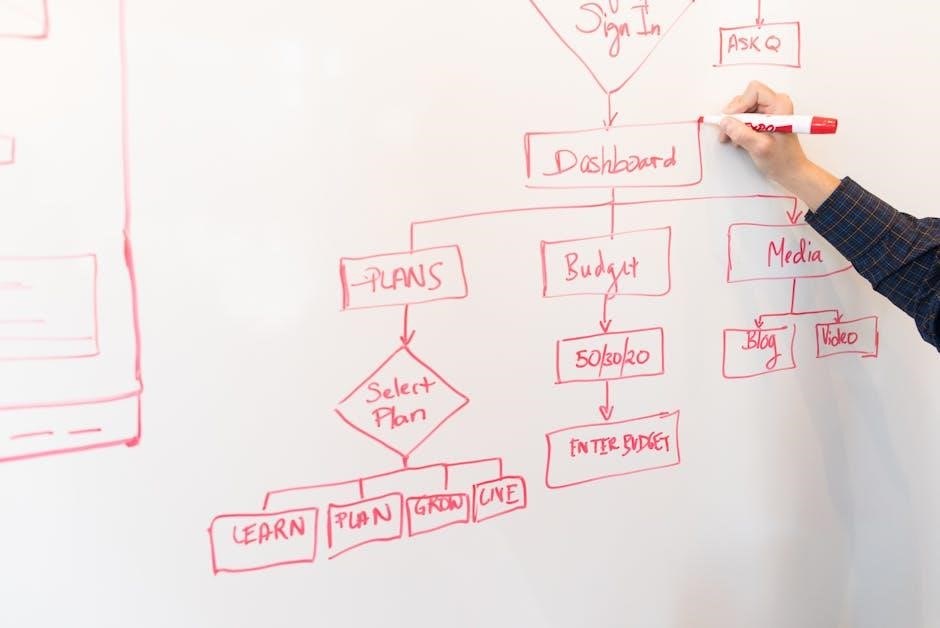The Curriculum and Instruction Certificate is a specialized program designed to enhance educators’ skills in curriculum design, instructional strategies, and educational leadership. It equips professionals with tools to develop standards-based curricula and improve teaching practices, catering to those seeking advanced training without pursuing a master’s degree. This certificate program is ideal for teachers, curriculum specialists, and educational leaders aiming to strengthen their expertise in creating effective learning experiences.
1.1 Definition and Purpose
The Curriculum and Instruction Certificate is a specialized academic program focused on equipping educators with advanced skills in curriculum design, development, and implementation. Its primary purpose is to provide professionals with the knowledge and tools to create standards-based curricula and enhance instructional strategies to improve student learning outcomes. Designed for teachers, curriculum specialists, and educational leaders, this certificate aims to bridge the gap between theoretical knowledge and practical application in educational settings. It emphasizes the importance of aligning curriculum with educational standards while fostering innovation and effectiveness in teaching practices.
1.2 Target Audience
The Curriculum and Instruction Certificate is tailored for educators seeking to enhance their expertise in curriculum development and instructional strategies. It primarily targets teachers, curriculum specialists, and educational leaders who aim to advance their professional skills without pursuing a master’s degree. This program is ideal for professionals interested in improving student learning outcomes through innovative and effective teaching practices. It also caters to those aspiring to roles in educational leadership or curriculum design, providing them with the tools to align curricula with educational standards and foster academic excellence in K-12 and higher education settings.
1.3 Program Overview
The Curriculum and Instruction Certificate is a graduate-level program designed to provide educators with advanced knowledge in curriculum development, instructional strategies, and educational leadership. Typically requiring 9-12 credit hours, this program can be completed in one year or less, depending on the institution. It offers a flexible format, including online and hybrid options, to accommodate working professionals. The program focuses on practical applications, enabling participants to design standards-based curricula, implement innovative teaching methods, and assess student learning effectively. It is ideal for educators seeking to enhance their professional skills and stay current with best practices in education without committing to a full master’s degree.

Program Structure and Requirements
The Curriculum and Instruction Certificate typically requires 9-30 graduate-level credit hours, with a duration of 1-2 years. It offers flexible formats, including online and hybrid options, catering to working professionals.

2.1 Credit Hours and Duration
The Curriculum and Instruction Certificate typically requires between 9 to 30 graduate-level credit hours, depending on the institution and program intensity. Most programs are designed to be completed within 1 to 2 years, offering flexibility for working professionals. Some accelerated options may be finished in as little as 6 months, while others allow up to 2 years for completion. Credit hours are distributed across core courses, electives, and sometimes a capstone project, ensuring a comprehensive understanding of curriculum design and instructional strategies. This structure accommodates both full-time and part-time enrollment, making it accessible to educators with varying schedules and commitments.
- Average credit hours: 9-30
- Duration: 6 months to 2 years
- Flexible pacing options available
2.2 Core Courses and Electives
The Curriculum and Instruction Certificate includes a mix of core courses and electives tailored to enhance expertise in curriculum development and instructional practices. Core courses focus on foundational topics such as standards-based curriculum planning, instructional design, and assessment techniques. Electives allow students to specialize in areas like educational technology, leadership, or culturally responsive teaching. This blend ensures a well-rounded education, enabling professionals to address diverse educational challenges. Courses are designed to align with current educational standards and best practices, providing practical skills that can be immediately applied in real-world settings. The program’s curriculum is structured to foster innovation and adaptability in teaching and learning environments.
- Core courses: Curriculum design, instructional strategies, assessment
- Electives: Educational technology, leadership, cultural diversity
- Alignment with current educational standards
- Practical application of skills
2.3 Online and Hybrid Formats
The Curriculum and Instruction Certificate is offered in flexible online and hybrid formats, catering to working professionals and educators. Online courses provide 24/7 access to materials, allowing students to complete assignments at their convenience. Hybrid programs combine online learning with periodic on-campus sessions, blending flexibility with face-to-face interaction. These formats are designed to accommodate diverse schedules and learning preferences, ensuring accessibility for those balancing careers and education. Both options maintain academic rigor, with interactive platforms that foster collaboration and engagement. This flexibility makes the program ideal for educators seeking to advance their skills without disrupting their professional lives.
- 24/7 access to online materials
- Hybrid blend of online and on-campus learning
- Flexible scheduling for working professionals
- Interactive platforms for collaboration

Benefits of the Certificate
The Curriculum and Instruction Certificate offers career advancement, enhanced teaching and leadership skills, and a competitive edge in education. It provides specialized knowledge to excel in educational roles;
3.1 Career Advancement Opportunities
Earning a Curriculum and Instruction Certificate opens doors to career advancement in education. Graduates can transition into roles such as curriculum specialists, instructional coaches, or educational leaders. The program equips educators with expertise in curriculum design and instructional strategies, making them competitive for leadership positions. It also prepares professionals to work in corporate training or educational consulting. By gaining advanced knowledge in curriculum development and assessment, certificate holders can pursue roles in educational administration or specialize in creating standards-based curricula. This certification bridges theory and practice, enabling educators to lead innovation in teaching and learning, positioning them for elevated roles in schools or organizations. It enhances career prospects and credibility in the field of education.
3.2 Enhanced Teaching and Leadership Skills
The Curriculum and Instruction Certificate empowers educators to refine their teaching practices and develop strong leadership abilities. By mastering curriculum design, instructional strategies, and assessment techniques, professionals can deliver more effective lessons and engage students meaningfully. The program emphasizes innovative teaching methods, enabling educators to adapt to diverse learning needs and foster inclusive classrooms. Additionally, it cultivates leadership skills, preparing graduates to mentor peers, lead educational initiatives, and contribute to school-wide improvements. This enhanced expertise not only elevates teaching quality but also equips educators to take on mentorship roles and drive positive change in educational settings, ultimately benefiting both students and institutions. Leadership and instructional excellence are at the core of this program.

Curriculum Development and Design
The Curriculum and Instruction Certificate focuses on developing skills to design and implement standards-based curricula; It emphasizes creating effective learning experiences aligned with educational standards and goals.

4.1 Standards-Based Curriculum Planning
Standards-based curriculum planning is a core component of the Curriculum and Instruction Certificate, emphasizing the alignment of educational content with established academic standards. This approach ensures that curricula are structured to meet specific learning objectives, fostering consistency and accountability across educational settings. By integrating national and state standards, educators can design coherent lesson plans that address student needs and promote measurable outcomes. The program equips participants with the skills to analyze and implement standards-based curricula effectively, ensuring that instructional strategies are both relevant and impactful. This focus on standards-based planning enables educators to create meaningful learning experiences that prepare students for future challenges.
4.2 Aligning Curriculum with Educational Standards
Aligning curriculum with educational standards is crucial for ensuring that teaching practices and learning outcomes meet established benchmarks. The Curriculum and Instruction Certificate emphasizes the importance of adapting curricula to align with local, state, and national educational standards. This involves mapping curriculum content to specific standards, assessing alignment gaps, and modifying instructional materials to ensure coherence. By focusing on standards alignment, educators can create a more cohesive and effective education system, ensuring that students meet expected learning objectives. This process also supports accountability and continuous improvement in educational settings, ultimately enhancing student achievement and preparing learners for future academic and professional success.

Instructional Strategies and Practices
This section focuses on evidence-based teaching methods, integrating technology, and innovative practices to enhance student engagement and achievement in educational settings.
5.1 Innovative Teaching Methods
Innovative teaching methods focus on engaging students through active learning, technology integration, and real-world applications. These approaches encourage critical thinking, creativity, and collaboration. Strategies include project-based learning, where students explore topics through hands-on projects, and flipped classrooms, which reverse traditional lecture-homework formats. Blended learning combines online and in-person instruction, offering flexibility and personalized pacing. Additionally, differentiated instruction tailors teaching to meet diverse student needs, while student-centered approaches empower learners to take ownership of their education. These methods foster a dynamic and inclusive learning environment, preparing students for success in a rapidly changing world. They also align with modern educational standards and best practices.
5.2 Assessment and Evaluation Techniques
Assessment and evaluation techniques are crucial for measuring student learning and instructional effectiveness. These methods ensure that curricula align with educational goals and standards. Formative assessments monitor progress during instruction, while summative assessments evaluate learning at the end of a lesson or course. Techniques include quizzes, projects, portfolios, and standardized tests. educators use data from these assessments to refine teaching strategies and improve student outcomes. Additionally, peer and self-assessment practices foster reflective learning. By integrating diverse evaluation methods, educators can ensure a comprehensive understanding of student performance and make data-driven decisions to enhance instruction and curriculum design, ultimately improving educational quality and accountability.

Roles and Responsibilities of Graduates

Graduates of the Curriculum and Instruction Certificate program are prepared to serve as curriculum specialists, instructional coaches, and educational leaders. They design curricula, provide professional development, and collaborate with educators to improve teaching practices and student outcomes, ensuring alignment with educational standards and goals.
6.1 Curriculum Specialists
Graduates of the Curriculum and Instruction Certificate program often serve as curriculum specialists, playing a pivotal role in designing, implementing, and evaluating educational programs. They collaborate with teachers and administrators to align curricula with educational standards, ensuring relevance and effectiveness. These professionals assess learning outcomes, develop instructional materials, and provide professional development to educators. Their expertise lies in creating engaging, student-centered curricula that address diverse learning needs. By integrating research-based practices, curriculum specialists contribute to improving academic achievement and fostering innovation in educational settings. Their work is instrumental in shaping the educational experiences of students across various grade levels and subject areas.
6.2 Educational Leaders and Administrators
Graduates of the Curriculum and Instruction Certificate program are well-prepared to serve as educational leaders and administrators, driving systemic improvements in schools and organizations. They gain the expertise to oversee curriculum development, assess program effectiveness, and lead instructional initiatives. These professionals often hold roles such as principals, department heads, or district-level administrators, where they collaborate with teachers and stakeholders to create aligned, standards-based educational frameworks. By integrating advanced knowledge of curriculum design and instructional strategies, they foster innovation and equity in education. The certificate equips leaders to address complex challenges and promote high-quality learning experiences for all students. Their role is pivotal in shaping the future of education.

Obtaining the Certificate
To obtain the Curriculum and Instruction Certificate, applicants must meet specific admission requirements, submit a complete application, and successfully complete the required coursework. The program typically involves 9 to 12 credit hours and can be finished online or in hybrid formats within one year. Admission criteria may include a bachelor’s degree, teaching experience, and Letters of recommendation. Upon completing all courses, graduates receive the certificate, enhancing their professional credentials in education.
7.1 Admission Requirements
Admission to the Curriculum and Instruction Certificate program typically requires a bachelor’s degree from an accredited institution, with a minimum GPA of 3.0. Applicants must submit official transcripts, letters of recommendation, and a resume. Some programs may require prior teaching experience or related coursework. International applicants must provide proof of English proficiency, such as TOEFL scores. Prerequisite courses in education or related fields may be necessary for certain programs. Application deadlines vary by institution, and some programs offer rolling admissions. Meeting these requirements ensures eligibility for the certificate program, designed to enhance professional skills in curriculum development and instructional strategies.
7;2 Application Process
The application process for the Curriculum and Instruction Certificate involves submitting an online application, official transcripts, and letters of recommendation. Applicants must also provide a resume and a personal statement outlining their educational goals. Some programs require prerequisite courses or teaching experience. International applicants may need to submit English proficiency scores, such as TOEFL or IELTS. Deadlines vary, with some programs offering rolling admissions. Once all materials are received, the admissions committee reviews the application. Accepted students receive notification and enrollment instructions. The process is designed to be straightforward, ensuring a smooth transition into the program for aspiring educators seeking specialized training in curriculum development and instructional strategies.
The Curriculum and Instruction Certificate offers a comprehensive pathway for educators to enhance their expertise in curriculum design, instructional strategies, and leadership. Designed for flexibility, this program caters to teachers, administrators, and curriculum specialists seeking advanced training without committing to a full master’s degree. By focusing on standards-based curriculum development and innovative teaching methods, graduates gain the skills to create engaging, effective learning experiences. The certificate also provides a strong foundation for career advancement, enabling professionals to take on leadership roles or specialize in curriculum development. Ultimately, this program equips educators with the tools to adapt to evolving educational demands and foster student success.